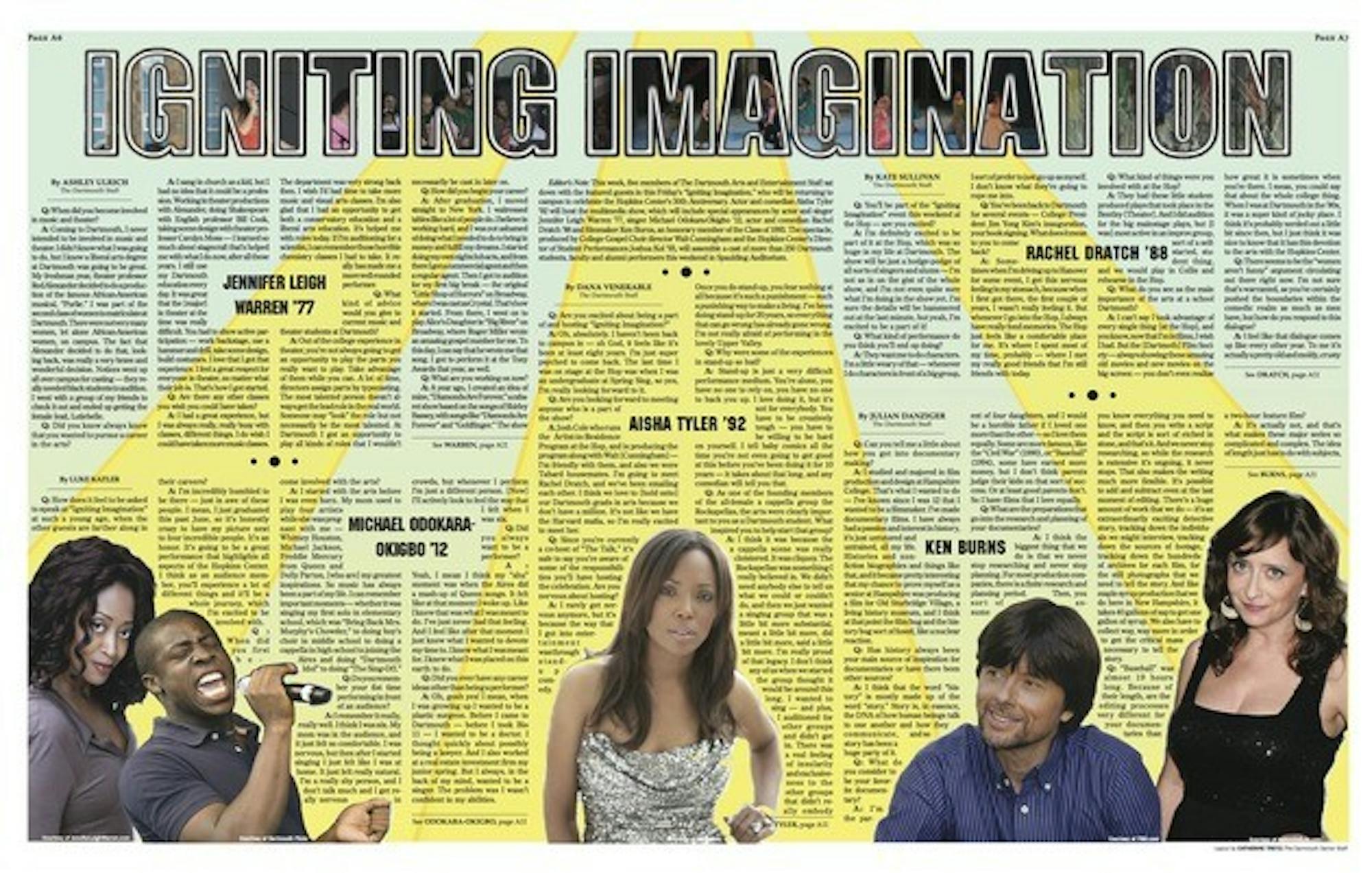Q: You'll be part of the "Igniting Imagination" event this weekend at the Hop are you excited?
A: I'm definitely excited to be part of it at the Hop, which was so huge in my life at Dartmouth. The show will be just a hodge-podge of all sorts of singers and alums I'm not as in on the gist of the whole show, and I'm not even quite sure what I'm doing in the show yet. I'm sure the details will be hammered out at the last minute, but yeah, I'm excited to be a part of it!
Q: What kind of performance do you think you'll end up doing?
A: They want me to do characters. I'm a little weary of that whenever I do characters in front of a big group, I sort of prefer to just go up as myself. I don't know what they're going to rope me into.
Q: You've been back to Dartmouth for several events College President Jim Yong Kim's inauguration, your book signing. What does it mean to you to come back?
A: Sometimes when I'm driving up to Hanover for some event, I get this nervous feeling in my stomach, because when I first got there, the first couple of years, I wasn't really feeling it. But whenever I go into the Hop, I always have really fond memories. The Hop just feels like a comfortable place for me. It's where I spent most of my time, probably where I met my really good friends that I'm still friends with today.
Q: What kind of things were you involved with at the Hop?
A: They had these little student-produced plays that took place in the Bentley [Theater]. And I did audition for the big mainstage plays, but [I was] most active in an improv group, sort of a self-started, student thing, and we would play in Collis and rehearse in the Hop.
Q: What do you see as the main importance of the arts at a school Dartmouth?
A: I can't say I took advantage of every single thing [at the Hop], and you know, now that I'm in films, I wish I had. But the [Dartmoth] Film Society always showing these amazing old movies and new movies on the big screen you don't even realize how great it is sometimes when you're there. I mean, you could say that about the whole college thing. When I was at Dartmouth in the '80s, it was a super kind of jocky place. I think it's probably nerded out a little bit since then, but I just think it was nice to know that it has this devotion to the arts with the Hopkins Center.
Q: There seems to be the "women aren't funny" argument circulating out there right now. I'm not sure that's warranted, as you've certainly pushed the boundaries within the comedic realm as much as men have, but how do you respond to this dialogue?
A: I feel like that dialogue comes up like every other year. To me it's actually a pretty old and moldy, crusty argument. People were saying that when I moved out to Chicago in 1989, it's just one of those things you always hear, and I'm just so sick of it. I have definitely worked with some of the funniest people, and many of them happen to be women. I kind of was lucky because I think in the old days at [Saturday Night Live], it was pretty hard for women, but I think by the time I got there, it was pretty equal opportunity, so I never really experienced the "women aren't funny" holding me back. I don't really delineate between funny women and men.
Q: What do you have in the works right now? Do you think you'll adapt your book for theater or film?
A: I'm in talks taking the early stages to see about changing it into a TV show or a stage thing. I'm sort of just starting, and beyond that I've gotten a lot pickier than I was in the early chapters of the book.
Q: Do you find yourself still creating characters like the ones you had on SNL?
A: No! That's why I don't want to do characters! It's funny back when I was on SNL or in Second City, you'd go through your day kind of open to whatever you see, but once you're off SNL you don't have that pressure. I'm not out looking for it. I don't have this whole staple of new characters. Instead, you try to think of show ideas, or the book took up a lot [of time]. That was a whole new creative journey for me.
Q: Would you have any advice for students or individuals interested in taking the comedy or entertainment route as opposed to more traditional post-Dartmouth jobs?
A: I don't have specific advice for people who just want to do writing, just because I didn't take that path. You have to kind of get used to the idea. You have to work hard, but that doesn't really work for the entertainment world. You have to create your own path, and so it's not, "Do this and this and then you'll be on TV." You have to kind of let go of the idea of knowing what's next, and that's kind of a big adjustment. For me, the first two years, I was like, "I'm not using my Dartmouth education. What am I doing out here?" There's no one path there's 100 different paths you could take.




